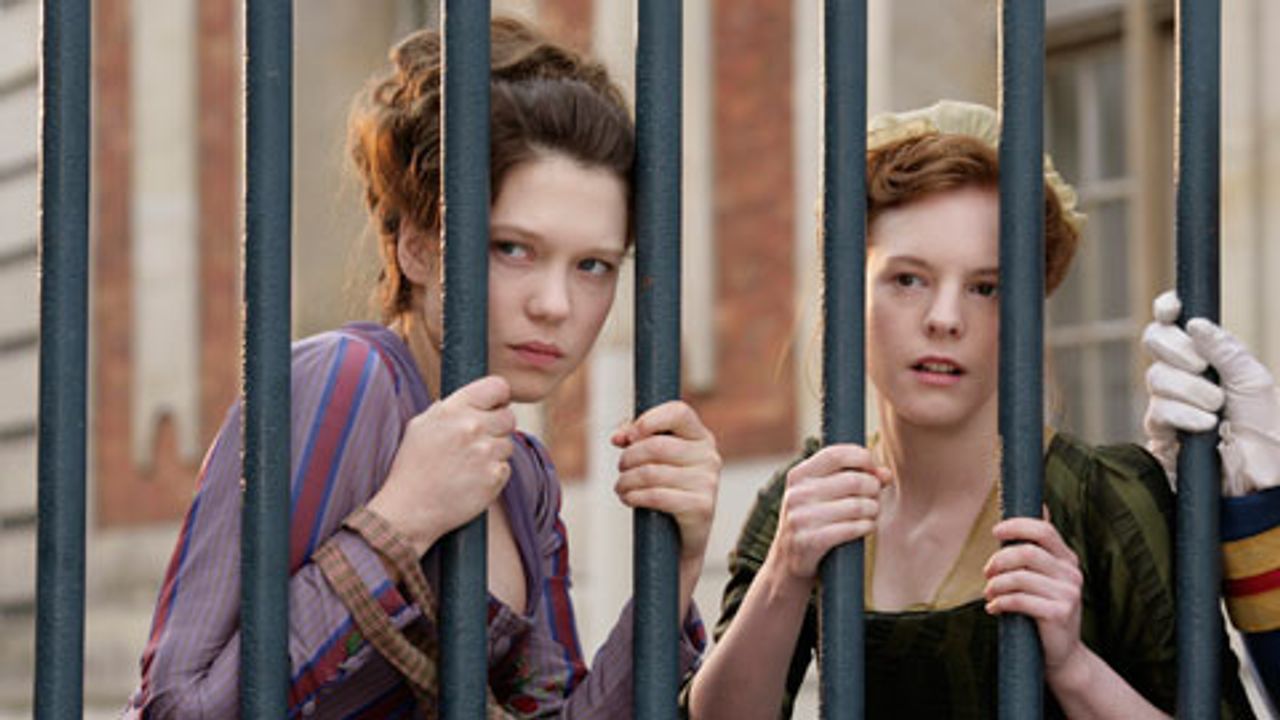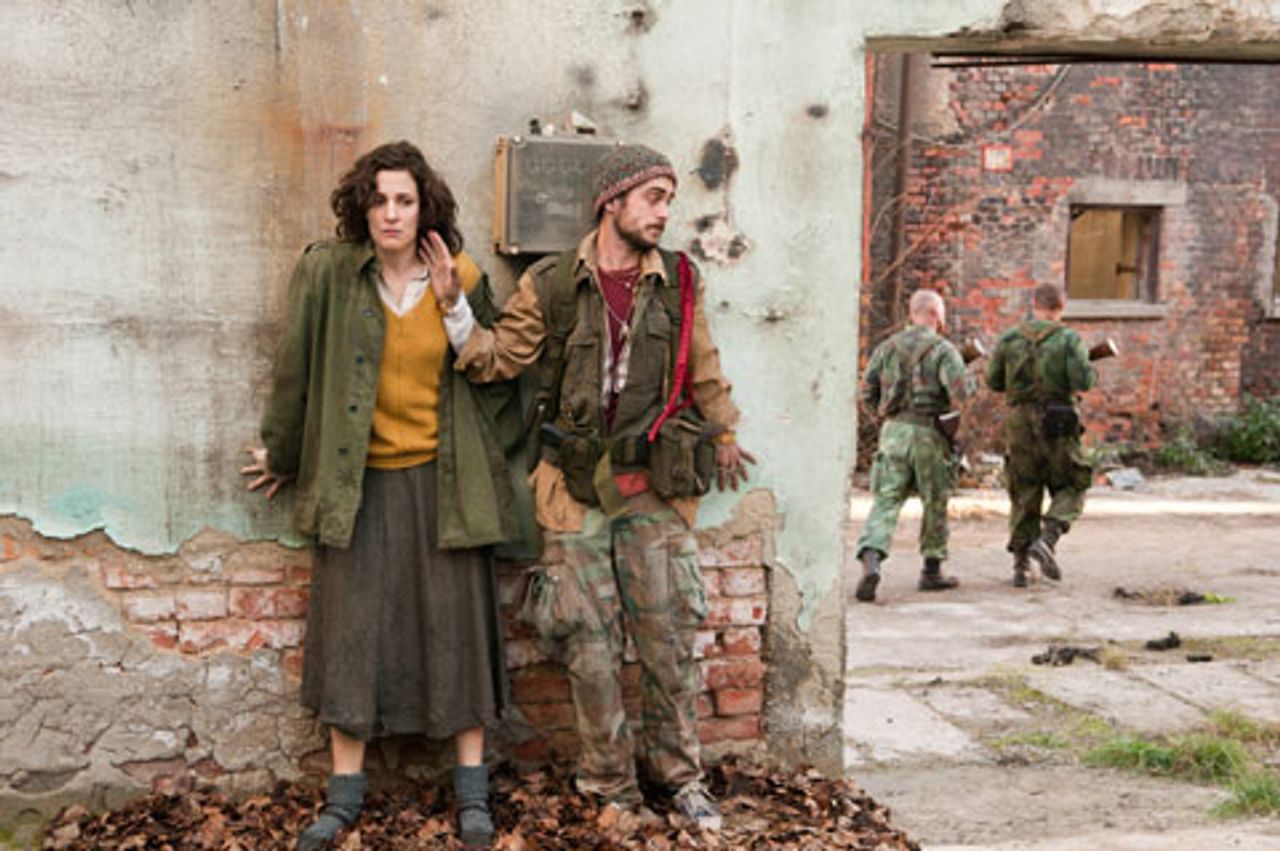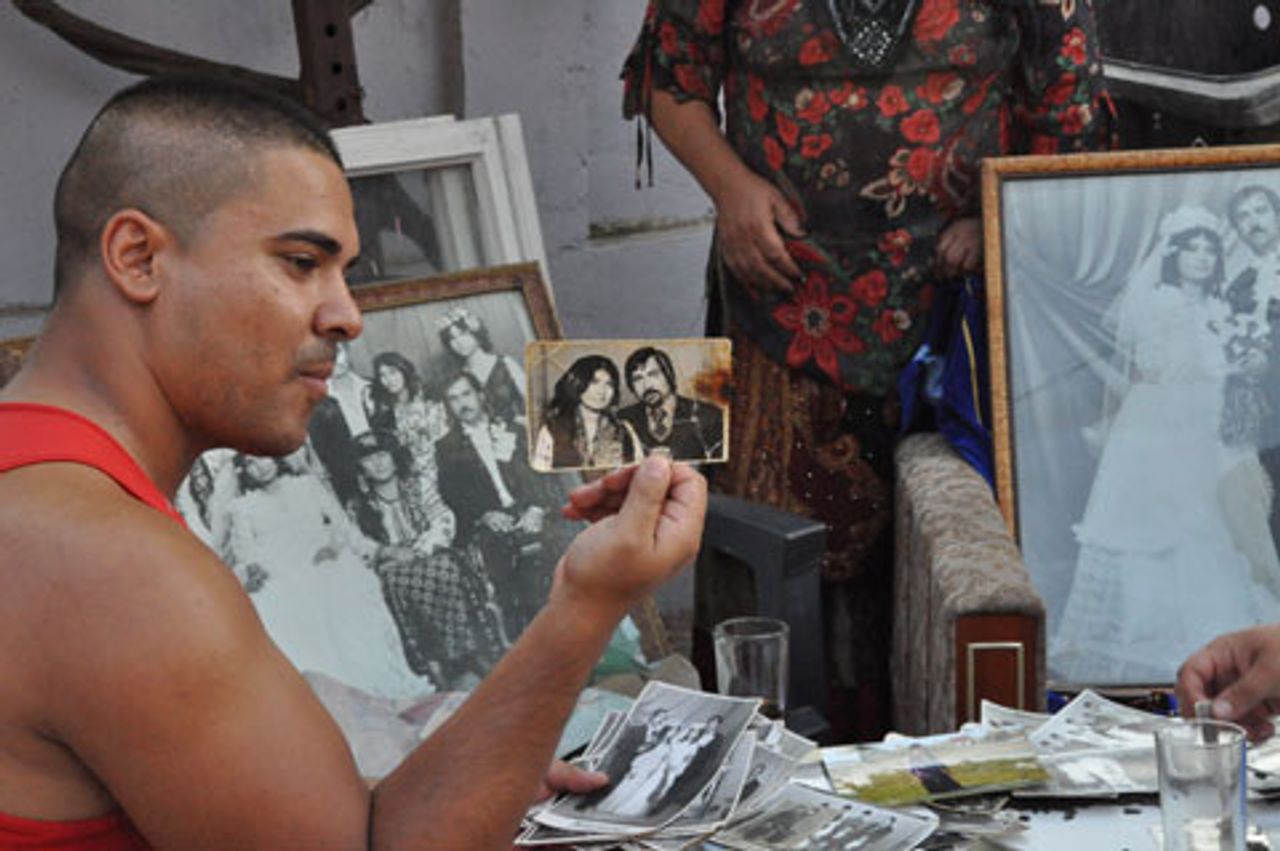This is the second of a series of articles on the recent Berlin film festival, the Berlinale, held February 9-19, 2012. Part 1 was posted February 24.
As noted in our introductory article, Berlinale festival director Dieter Kosslick stressed the political content in the program for the 62nd festival, which included “a lot of films about revolutions and new dawns”.
 Farewell My Queen
Farewell My QueenA number of film reviewers were quick to draw a parallel between the Arab Spring revolutions that took place during the past year and the opening film of the Berlinale, Farewell, My Queen, by the French director Benoît Jacquot. The main character in Farewell, My Queen is an attendant to the queen of France, Marie Antoinette. The action takes place in the Palace of Versailles at the start of the French Revolution in July 1789.
Actress Diane Kruger, who plays Antoinette, told the press in Berlin: “Any revolution, particularly this one [i.e., the French Revolution], is against an abuse of power and an abuse of money and that is still going on these days”. While the most striking aspect of the Arab Spring revolutions was the entry of broad masses of the population into political life, the masses in Jacquot’s film are off-camera, an ill-defined mob baying at the gates. The director chooses to dwell on the dilemma of Louis XVI’s entourage, housed (or more accurately imprisoned) in Versailles.
The figure of Marie Antoinette was already dealt with in the lamentable film by Sophia Coppola (2006). Jacquot’s film avoids the sugarcoated excesses of Coppola’s thoroughly superficial and irritating movie, but displays its own weaknesses. Farewell, My Queen explores the reactions of the various layers of the court as starving Parisians storm the Bastille and seize guns and ammunition. A list is circulating, drawn up by protesters, calling for the beheading of nearly 300 leading figures of the ancien régime.
Understandably, Antoinette’s husband Louis has his hands full. The queen tries with increasing difficulty to carry on life as usual, browsing fashion magazines and speculating on the colour to be favoured in European courts for the coming season. We observe the shenanigans of the court and the idlings of the queen through the eyes of one of her ladies-in-waiting, Sidonie Laborde (Lea Seydoux), who is evidently attracted to the queen.
The film points out the massive gulf between social layers that existed inside the palace itself. The magnificent apartments and luxurious bed of the queen are contrasted with the bare, cupboard-like room in which Laborde seeks to fend off the attention of aggressive mosquitoes and get some sleep.
The signs of decay are unmistakable. Dead rats float by in the water during what should be a relaxing boat ride across the palace’s Grand Canal. Time is running out for the assembled aristocracy. Armed workers and peasants are marching toward the palace. The game is up! A crazed rush to the exits begins, with princes, counts and privy counsellors vying with one another for a place in the next coach to leave Versailles for abroad and safety from the “mob”.
The scenes of disarray amongst the aristocratic lackeys of Louis are convincingly done; at the same time, the portrayal of the depths of opportunism and egoism of the French ruling elite is thin gruel for a full-length feature film. We learn little of the motives impelling the “angry mob” moving towards the gates of the palace. The most annoying aspect of Jacquot’s film is his attempt to inject spice into the whole affair by implying that, neglected by her husband, Antoinette seeks solace in the arms of another woman—the courtier Gabrielle de Polignac. Together with the infatuation with the queen on the part of Laborde, we have what one critic refers to as an “all-female love triangle playing out in the confines of Versailles”.
One wonders what is going on in the head of the director. Does he really think that a feature film dealing with the French Revolution will not find enough viewers unless he includes a titillating element? The French Revolution is the classic example of a revolution motivated by massive national and international class antagonisms summed up in the social inequality prevailing in France at the end of the 18th century. This remains the significance of the revolution for today. Jacquot evidently recoils from this conclusion and instead feels obliged to introduce a story line that undermines what could have been a powerful dramatic presentation of the death throes of the feudal regime.
 The Land of Blood and Honey
The Land of Blood and HoneyIn The Land of Blood and Honey is the directorial debut of actress Angelina Jolie. The film is set in Serbia in the run-up to the Bosnian war of 1992-95. Nothing in the story convinces, beginning with a disco date between the Serb policeman Danijel and the Bosnian Muslim painter Ajla prior to the outbreak of fighting.
Although the two are apparently meeting for a first date in the disco we are asked to believe that policeman Danijel is prepared to risk everything in the course of the ensuing war, including his own military career, to shield his beloved Ajla. A bomb exploding outside the disco signals the start of wider hostilities.
Ajla is taken prisoner by Bosnian Serb soldiers and imprisoned in a detention camp with a group of other women. The women have been gathered together to carry out menial duties and satisfy the sexual appetites of the Serb soldiers—now led by Danijel. Incarceration in the camp begins with a mass rape in the open of a number of the women by their Serb keepers. Throughout the film the Serb soldiers are presented as little better than gun-toting, murderous rapists.
The only exception to the rule is Danijel, now promoted to head the troop of marauding soldiers. In most unlikely fashion, Captain Danijel, son of an ultra-nationalist Serbian general, is portrayed as the sole voice of reason amongst the Serbs, always ready to extend a protecting hand to Ajla.
In order to avoid the charge of a prejudicial treatment of the Serbs, Jolie inserts two unconvincing scenes replete with wooden dialogue. In a brief pause in the fighting, Danijel turns to a fellow soldier and curtly congratulates him on the news that his wife is having a baby. Serbs, we learn, also have families.
In another scene a group of Bosnian Muslims gather round an open fire. One declares baldly: “I do not hate all Serbs, just the Chetnik Serbs” (referring to the ultra-monarchist, paramilitary organization from the first half of the 20th century). Another sitting round the fire nods his head: “Yes, just Chetnik Serbs”.
The chief deficiency of the film, however, which accounts for its one-sidedness, is the failure to mention any of the international forces that provoked the fighting in Bosnia in the first place.
This reporter attended the premiere of the film in Berlin, which was attended by no less than two German foreign ministers—the current minister Guido Westerwelle (Free Democratic Party) and the former German foreign minister Joschka Fischer (the Greens)—plus another leader of the Greens, Jürgen Trittin. All of these figures would have no problem with Jolie’s film, which completely whitewashes their own responsibility for the conflict in Bosnia.
It was Westerwelle’s party colleague, former German foreign minister, Hans Dietrich Genscher, who encouraged the break-up of the former Yugoslavia by supporting the independence of Germany’s postwar ally, Croatia. When fighting spread to Bosnia it was then the US that stoked the fires by lining up behind Bosnia, backing the statelet’s membership of the UN in 1992.
Seven years later, in 1999, foreign minister Fischer organised the first aggressive foreign intervention by the German army since 1945, based on his campaign to combat “Serbian war crimes”.
For Jolie, a longtime special ambassador for the United Nations, the role of these international agencies is a closed book. She has nothing to say about the role of US and European imperialism because she uncritically supports its operations. Her criticism of the “international community” is that it has failed to react quickly enough to the “crimes” of other nations. On this basis, Jolie has expressed her support for the recent imperialist intervention against Libya.
Jolie’s film will undoubtedly appeal to a political layer who unreservedly back military action by the international community in support of their own conception of women’s rights or human rights, but it is impossible to produce anything of value—including film drama—on the basis of such an approach.
British filmmaker Sean McAllister (Liberace of Baghdad 2005, Working for the Enemy 1997) is in two minds about the value of foreign interventions in the popular uprisings taking place in Arab countries.
In a question-and-answer session after the screening of his new documentary film The Reluctant Revolutionary, I asked his opinion about the imperialist intervention in Libya. McAllister replied that his gut reaction was to support any such intervention that put an end to the oppressive measures of the Libyan regime. At the same time, he added, he was aware of the arguments that such interventions never yield anything positive in the long term.
The merit of McAllister’s new film, which deals with the revolutionary upheavals in Yemen, is that it does provide a genuine glimpse into the dynamics of the mass movement, which in the course of eight months led to the ousting of the hated president, Ali Abdullah Saleh. The “reluctant revolutionary” referred to in the title is Kai, a 35-year-old father of three with a troubled marriage, who works in his father’s travel agency.
After providing some background information to the turbulent situation in the country, including long-time backing for the dictatorial Yemeni regime by the US, we accompany Kai and McAllister and the latter’s hand-held camera on a series of demonstrations beginning on March 18, 2011—the so-called “Friday of Dignity”, when 52 peaceful protesters were shot to death by government agents.
In his first tour of the protests conducted in what has been renamed Change Square, Kai is thoroughly sceptical of the demonstrations—albeit for good reason. He fails to detect any clear perspective in the rapidly burgeoning movement. What begins as a localised protest rapidly develops into a massive demonstration of popular resistance. Every violent intervention by the state, every casualty, only serves to fire the determination of the protesters to topple the regime. In one harrowing sequence we accompany the courageous pair, Kai and McAllister, to a hospital in which dozens of bloody victims of the state forces, injured and dying, including young children, are being treated under chaotic conditions.
The film makes clear, given such circumstances, it is impossible to remain neutral. Kai declares his complete commitment to the revolution. The issue of perspective for the mass movement after the ousting of the president is not addressed in the film. McAllister’s own equivocation on the role of Western military intervention indicates that he has little to offer in this respect.
One outstanding film at the Berlinale with a highly explosive political content was the documentary film Revision by the German director Philip Scheffner.
 Revision
RevisionIn July 1992, two men were shot in a field near the German-Polish border. One of the victims was the Roma Grigore Velcu. He and his family had fled Romania in 1990 following a wave of hostility towards Roma in the wake of the collapse of the country’s Stalinist regime. The Velcu family travelled to Germany where they were accommodated in a refugee centre.
Shortly afterward, Grigore’s mother died and was buried in the local village cemetery. Following the desecration of her tomb, Grigore returned illegally to Romania to obtain the papers to permit the repatriation of her body. In the course of his return to Germany, as one of a small group crossing the border illegally, he was killed along with fellow Romanian Eudache Calderar by a bullet from a hunting rifle.
Nearly 20 years after the shooting, Revision returns to the scene of the crime. The film switches between Germany and Romania to interview many of those concerned—the family of the victims, the farmers who first found the bodies in their fields, the police and judicial officials involved in the case. One interviewee in Romania declares he was a member of the group crossing the border in Germany and witnessed the shooting. According to his version, the shooting was carried out by police firing sniper rifles from the bonnet of a police car.
We learn that two men were charged in connection with the shooting. One of the men is a former German policeman who conducted hunting expeditions in the 1990s in the border region. The German media reported on the deaths at the time, speculating that in the darkness hunters had mistaken the refugees for wild game. When it became clear that the light at the time of the shooting was sufficient to clearly identify targets the story changed. Papers published sensationalist reports of hunters who had mistakenly shot criminals seeking to transport immigrants across the German border.
The survivors from the group who had sought to enter Germany along with Grigore and Eudache were transferred to an asylum centre in the northern German town of Rostock.
A photographer who was in Rostock in August 1992 tells us of his shock when he realised that the police had withdrawn from their positions around the besieged asylum home, thereby allowing a neo-fascist mob to petrol bomb and destroy the centre. In the wake of the pogrom, the remaining Roma were deported back to Romania and prevented from testifying in the case of their two dead companions. Until being contacted by filmmaker Scheffner two decades later, the families of Velcu and Calderar had not heard a single word from the German authorities regarding the circumstances of the two deaths at the border.
Shortly after the pogrom in Rostock-Lichtenhagen—and a broad media campaign vilifying immigrants—the German asylum law was effectively abolished with the approval of all the leading parties, including the Social Democratic Party. The abolition of the right to asylum was the green light for the German state to deport tens of thousands of immigrants seeking shelter, including thousands of Roma.
Following a series of long drawn-out legal procedures, both of those suspected of involvement in the shooting at the border were acquitted on all charges in 1999.
At one point, the film adds the information that, according to NGO Fortress Europe, 14,687 people died attempting to cross European borders between 1988 and August 2009. Scheffner’s fine film puts flesh and blood on this appalling statistic.
